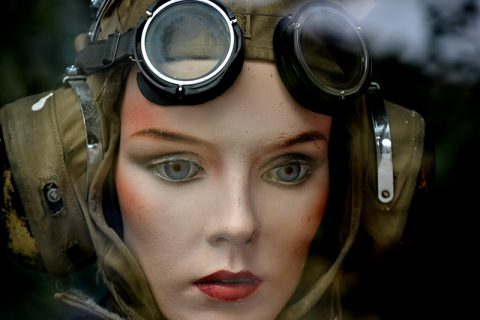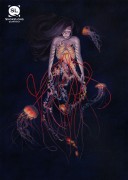One of the joys of flash fiction, I think, is how a small event can peel away to reveal something larger. Your piece did just that for me. The everyday shines through the sibling relationship, the donut shop, the heat, but the heart is something weightier and more meaningful for Leeasha. Can you talk a bit about which comes first for you–the everyday actions or the larger, final notes?
When I really like an author’s writing, it’s usually because the “something larger” is working for me. With my own writing, I used to both start and end there; as a result, my poor early stories were extremely abstract — no everyday actions, no action, etc. Now I guess you could say I purposely look for everyday things — often as a first step — to help me do a better job writing about those something largers.
In this case, my inspiration was the time I traveled through northern Louisiana on a Greyhound that stopped, unplanned, at a donut store. I didn’t eat a donut, but there was a general commotion about how bad they were. Something about those old-looking brown donuts in their little bins really got to me. My intention was to keep the story pretty concrete and avoid descending into melancholy over the donuts. But of course equally important was the weather; those same donuts in a different town would have been very different donuts. Overall, I’d say this is a story where the everyday and the something else (whether larger or just harder to identify) are very much dependent on each other.
You bring up a transition that so many of us go through–recognizing whatever it is that unites those “poor early stories” and from there, seeking new content or new structures or both. What in your writing has always been true, and what else has undergone transformation?
I’ve been drawn to wordplay and language-oriented writing since I was about eleven. My two favorite writers then—John Lennon (not his lyrics so much, but In His Own Write and A Spaniard in the Works) and Lewis Carroll—are favorites now, too. In one moment of inspiration, I swapped “One day” for “Two day” — only when I returned to the story several months later, I didn’t immediately remember why that unfortunate phrase was there or what it meant.
My style has changed a lot, but that’s mostly thanks to growing older and writing (semi) regularly over a period of years. I’m still drawn to the same sorts of things. The same is true of themes, which I’ve been pretty consistent with. My compulsion to tap into something I find unsettling, like time or weather, is a big part of why I write.
What’s that compulsion about? I ask because it’s one I share for sure. When I read your story, a foreboding sense definitely cuts through. Eerie lines stand out like, “The air is hot, wet, a weight around their necks,” and then, “Leeasha looks for a great nothing, a colossal and plentiful nothing, but there isn’t one,” and later, “Will has gone back into the pool; he’s complaining about the water. It is stagnant, he says. Diseases are thriving in it, he says.” It’s not an imminent threat that you’ve created, but without a doubt a hidden danger lurks. Is there any real danger for Leeasha or Will? Does there have to be?
I think of my compulsion to write about certain subject matter as a cosmetic preference. Some people write about, say, vampires, and others about trains, and at the end of the day it’s not so different from liking one cut of coat over another. Where does that preference come from? Who knows?
Then there’s the subject matter itself, which I’d describe roughly as the suite of fundamentals we’re driven to explore: consciousness, death, memory, time — and so on in that melodramatic vein. It comes and goes, and may yield enormously different things for different people, but I think experiencing a sense of disruption in the face of these fundamentals is something we all go through. That sounds like either a bold thing to say, now that I see it in print, or a truism — I’m not sure which.
For a long time, all my protagonists were overtly trying to come to terms with this stuff. But in many ways, Leeasha is in the same boat, and probably Will, too. In my mind there’s no ‘real danger,’ as you say, though some readers may decide differently. But the particulars of the day (the weather, the man, etc.) have jolted them into an awareness of these fundamentals, and that carries its own sort of danger. Leeasha experiences an unrest that doesn’t have an easy explanation or solution. Maybe for her there won’t be one.
You mentioned pulling from everyday happenings, a love of John Lennon and Lewis Carroll. What else are you reading or watching or listening to these days that gets the writing muscle moving? In other words, “what’s stacked on your nightstand?”
I ordered two books recently and I’m so excited for them to arrive: The Absolution of Roberto Acestes Laing by Nicholas Rombes and Radio Iris by Anne-Marie Kinney. Bruno Schulz’s collection The Street of Crocodiles is one of the most interesting books I’ve read in the last year. Nabokov, Salinger, and Richard Hughes are among my go-to authors. Generally speaking I’d rather read something I’ve already read than something I haven’t, which can be a problem.
I could talk for pages about the “listening” part of the question, so I’ll be strict with myself and say one thing: if I’m feeling down, or in need of inspiration, or both, I listen to “Owed T’Alex” by Captain Beefheart. It shouldn’t be beautiful — all those chaotic elements battling for attention — but it is.



 The core workshop of SmokeLong Fitness is all in writing, so you can take part from anywhere at anytime. We are excited about creating a supportive, consistent and structured environment for flash writers to work on their craft in a community. We are thrilled and proud to say that our workshop participants have won, placed, or been listed in every major flash competition. Community works.
The core workshop of SmokeLong Fitness is all in writing, so you can take part from anywhere at anytime. We are excited about creating a supportive, consistent and structured environment for flash writers to work on their craft in a community. We are thrilled and proud to say that our workshop participants have won, placed, or been listed in every major flash competition. Community works.